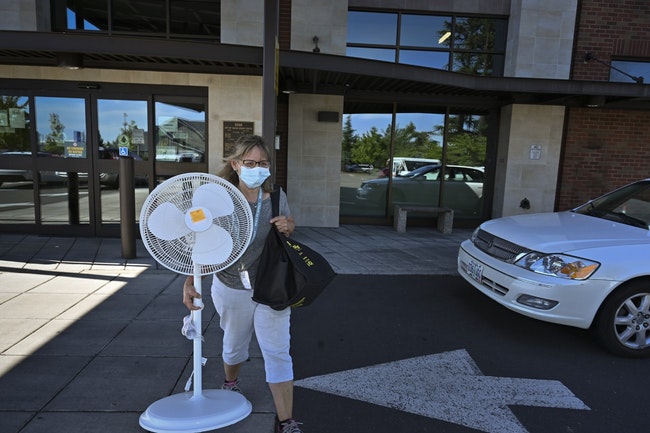
A Meals on Wheels volunteers distributed electric fans in Salem ahead of the June 2021 heat wave. State efforts to expand air conditioning following the event are running slowly. (Ron Cooper/Salem Reporter)
The Legislature allocated millions of dollars this February and in 2021 toward protecting thousands of Oregonians from extreme weather and smoke-filled air.
But that money has yet to help anyone.
The Oregon Health Authority, which oversees a program to distribute air conditioning units to vulnerable people, awaits the delivery of 700 units on Friday.
The agency hopes to purchase another 2,300 units but they have not been ordered.
Philip Schmidt, an OHA spokesman, said the agency has $5 million to spend on the units through the end of the current two-year budget cycle on June 20, 2023.
The state Department of Human Services is overseeing a $7 million expansion of centers to keep people without homes or others cool, warm or unpolluted air. But that effort has been slow to advance. When projects are approved, few will offer respite from extreme heat. The department is focusing on clean air projects.
“We have been working to get this support into communities since January,” said Jake Sunderland, press secretary for DHS. “Because the majority of the funds have been dedicated to clean air shelters in case of emergency air conditions, this is where the majority of our efforts have focused.”The department asked for shelter proposals in January. No one responded, Sunderland said.
“It’s worth noting that entities seeking shelter support are required to open the shelter to the public free of charge and notify 211 when the shelter is open,” Sunderland said.
In April, the department tried again, asking schools, local governments and tribal nations for proposals. It has received dozens of applications spanning 30 counties, Sunderland said. But few will keep people cool.
“Of the 159 applications we have received, 18 said ‘yes’ they are seeking HVAC cooling support, and 13 said they ‘may be’ interested in HVAC cooling support,” Sunderland said. “No funds or support have been distributed, as we are still assessing and reviewing applicant needs.”
It’s not clear when the projects will move forward.
Heat pump program yet to launch
The Legislature also approved $25 million for heat pumps, which provide both heating and cooling, and $2 million to help landlords establish shared cooling spaces for tenants. The Oregon Department of Energy is overseeing this funding. At the beginning of June, Christy Splitt, government relations coordinator for the department, told a legislative committee that work has not yet started on these programs. She said the department is signing a contract with the Energy Trust of Oregon to work with landlords on shared cooling spaces. As of this week, that contract is still not finalized, according to Jennifer Kalez, spokesperson for the Energy Department.
The department will contract with entities statewide to develop community heat pump programs. The $10 million program aims to help “environmental justice communities” which are often lower-income areas where many residents have unsafe homes, are exposed to pollution or lack heating and cooling. The program will reimburse 100% of the cost.
The other heat pump program, with $15 million in funding, will reimburse 60% of the cost for landlords to install cooling units.
Kalez said the department has not yet launched these programs but is working on planning and outreach.
“These are in the earliest stages,” Kalez said. “We don’t have estimates on participants or additional details yet. ODOE will be hiring staff to coordinate program development.”
Air conditioning units ordered
In the meantime, the Oregon Health Authority plans to distribute the 700 air conditioning units it expects to receive next month to community-based organizations and regionally based Medicaid insurers, Schmidt said. Orders for more units are in the works, he said.
Medicaid insurers – known as coordinated care organizations – cover physical, mental, dental and vision services for most of the 1.4 million Oregonians on Medicaid. They also can distribute air conditioning units to members with a provider’s prescription under a program that covers items that can affect a person’s health.
Becca Thomsen, a spokesperson for CareOregon, which covers more than 500,000 Medicaid members in the Portland area and Jackson, Clatsop, Columbia and Tillamook counties, said it has distributed 150 units since 2020 at a cost of $51,500. She said CareOregon has also identified people who would be at high risk when temperatures soar.
“We have been proactively reaching out to them to ensure they have safety plans in place for hot weather and, in some cases, to see if they could benefit from a cooling appliance that meets their needs,” Thomsen said.
PacificSource, which insures about 325,000 Medicaid members in the Columbia River Gorge and Lane, Marion and Polk counties, paid for 24 AC units in 2021 and 2020, spokesman Lee Dawson said. He did not have the full cost.
Project Access Now, a Portland nonprofit that helps low-income residents access health care, said in a tweet it recently distributed 90 AC units to vulnerable people. Its spokesperson did not respond to requests for comment.
Those without a cooling unit can keep residences cooler with some simple actions, according to a recent University of Oregon study. It created simulations using weather data from the severe heat wave in 2021. It found that keeping blinds down and drapes closed during the day combined with keeping windows open at night, if safe, prevented apartment temperatures from rising into a “danger zone.” Prolonged exposure to temperatures above 85 or 90 degrees, especially with high humidity, can cause harm. Old and young people, those who are obese or taking certain drugs face the highest risk from heat, experts say.
“In the Pacific Northwest, where we get such cool night air, we have an amazing climate for passive cooling,” said Alexandra Rempel, a University of Oregon building scientist who led the study. “We should take advantage of it.”
Oregon Capital Chronicle is part of States Newsroom, a network of news bureaus supported by grants and a coalition of donors as a 501c(3) public charity. Oregon Capital Chronicle maintains editorial independence. Contact Editor Les Zaitz for questions: [email protected]. Follow Oregon Capital Chronicle on Facebook and Twitter.
STORY TIP OR IDEA? Send an email to Salem Reporter’s news team: [email protected].









